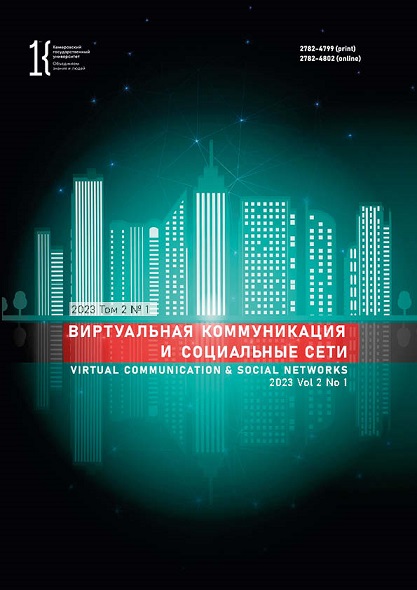Kemerovo, Russian Federation
Kemerovo, Russian Federation
The article considers the ratio of centripetal and centrifugal tendencies in comments to online news. The authors focused on the consistency of commenting and the centrifugal aspect. The hypothesis proved in this article refers to the self-developing nature of communication in social networks. It makes it possible to assess the extent of subjectivity of news discussion transmitted to the dialogue through the comments. Any online text becomes a basis for comments, which are also independent texts. The text that triggers further discussion is heterogeneous and ambiguous in its topics, issues, accents, and modalities. This heterogeneity is the source and potential of the centrifugal nature of further discussion. Comments to the original text form chains and branches of discussions. They are analyzed according to criteria that demonstrate a centrifugal tendency. The research featured an Internet text from the Vkontakte social network, comments to this message, and a mental map of the discussion. The analysis proved the consistency of the original text and the comments, as well as the consistency of the two opposing trends. This article continues the topic started in the publication on the Centripetal Trend in News Comments in Social Networks. It will be of interest to a wide range of readers, especially those engaged in social network studies and Internet linguistics.
social networks, internet text, comments, commentators, centripetal trend, centrifugal trend
1. Golev N. D., Kim L. G. Trivial political Internet commentary as a manifestation of variability of interpretation (oppositions "explicit - implicit" and "manifested - expected"). Implicit and explicit strategies in Eastern European political discourse: Proc. of the Russian section of the Intern. Conf. "Ain't misbehavin'? Implicit and explicit strategies in Eastern European political discourse", Ekaterinburg, 21-22 Oct 2013. Ekaterinburg-Zurich: UrSPU, 2014, 47-70. (In Russ.) EDN: https://elibrary.ru/UBGDGD
2. Golev N. D., Sushkina M. A. Centripetal trend in comments to news in social networks. Virtual Communication and Social Networks, 2022, 1(4): 185-190. (In Russ.) https://doi.org/10.21603/2782-4799-2022-1-4-185-190
3. Zekeriaev R. I. Types of virtual personality of an Internet user. Uchenye zapiski. Elektronnyy nauchnyy zhurnal Kurskogo gosudarstvennogo universiteta, 2019, (1): 255-263. (In Russ.) EDN: https://elibrary.ru/EBKDWN
4. Imber S. Yu. Web comments as evaluative statements: Spiegel Online news group on Facebook. Vestnik of Moscow State Linguistic University. Humanities, 2020, (13): 48-56. (In Russ.) EDN: https://elibrary.ru/CHXWKF
5. Novgorodova E. V. Conflict of interpretations as a cognitive basis of linguistic conflictology in everyday political comments. Kemerovo: KemSU, 2021, 197. (In Russ.) EDN: https://elibrary.ru/TWXBTP
6. Stroganov V. B., Voroshilova M. B. "Rhizomorph" of social networks as a stage of transition to the Web 3.0 system. Social networks: a complex linguistic analysis, eds. Golev N. D., Kim L. G. Kemerovo: KemSU, 2021, vol. 1, 30-40. (In Russ.) EDN: https://elibrary.ru/VGCIIZ
7. Topchii I. V. Comment in journalism and social media. Znak: problemnoe pole mediaobrazovanija, 2020, (2): 157-162. (In Russ.) https://doi.org/10.24411/2070-0695-2020-10216
8. Fomina Yu. A. Aspects of language assessment study. Bulletin of Chelyabinsk State University, 2007, (20): 154-161. (In Russ.) EDN: https://elibrary.ru/NCBLGL
9. Shpilnaya N. N. Russian dialogic text: derivational aspect. Dr. Philol. Sci. Diss. Kemerovo, 2016, 623. (In Russ.) EDN: https://elibrary.ru/GLTXBH
10. Shpilnaya N. N. The linguistic worldview in the structure of the verbal and cogitative activity of the Russian linguistic persona: essays on V. A. Serov's The Girl with Peaches. Cand. Philol. Sci. Diss. Kemerovo, 2010, 169. (In Russ.) EDN: https://elibrary.ru/ULFRID


















